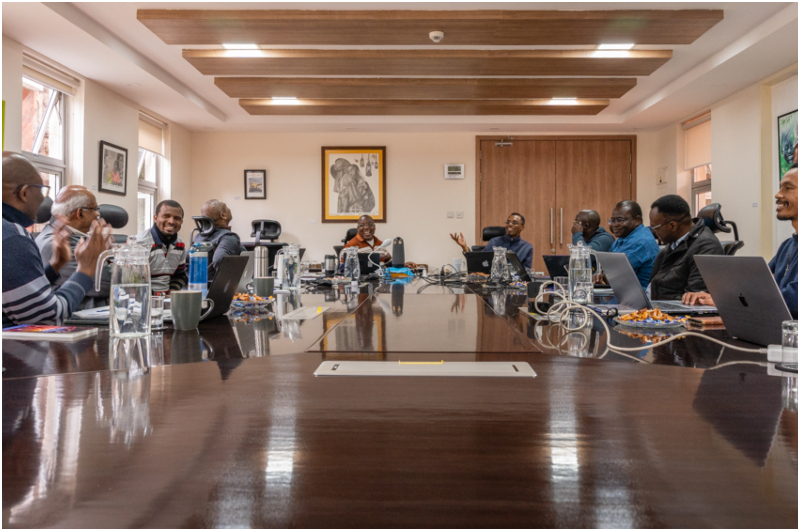

Nairobi, Kenya | August 3, 2025 – The much anticipated Symposium of African Jesuits in Science (AJiS) officially opened at Africama House in Nairobi, bringing together a diverse and dynamic community of Jesuits, scientists, ethicists, theologians, and collaborators.
United by a commitment to faith-driven inquiry, participants are reflecting on the theme: “Smart Planet, Just Future: AI and Ecology in the Fight for Sustainability.”
The symposium’s opening remarks were delivered by Fr. John the Baptist Anyeh-Zamcho, SJ, Socius to the President of the Jesuit Conference of Africa and Madagascar (JCAM), on behalf of Fr. José Minaku, SJ, the President, whose leadership has been central to the growth of the initiative, was commended for his visionary commitment—not only in providing encouragement, but also in securing financial support that has made the gathering possible.
In his address, Fr. Anyeh-Zamcho emphasized the significance of the gathering as a milestone in Jesuit scientific engagement on the continent:
“This meeting marks a key moment to strengthen our collaboration. It affirms our shared mission of rigorous inquiry and innovation grounded in Jesuit values. Many of you are at the cutting edge of scientific research, and this symposium showcases our commitment to shaping the scientific landscape in Africa and Madagascar.”
He extended special thanks to the JCAM Major Superiors for their consistent financial support of AJiS over the years—a contribution that has helped sustain the program and significantly reduce operational costs. Their trust in the initiative reflects the growing recognition of science as a critical frontier in Jesuit apostolic work.
He also expressed deep appreciation to Fr. Jean Baptiste Kikwaya, SJ, for his pivotal role in guiding the AJiS initiative in recent years. His leadership has helped shape the mission's direction, and the symposium stands as a testament to the foundation he helped lay.
Looking ahead, Fr. Anyeh-Zamcho, SJ noted that the AJiS initiative enters a new phase under the leadership of Fr. Jerome Manyahi, SJ, and Fr. Alain Pitti Djida, SJ, both of whom he congratulated for accepting the responsibility of steering the program forward.
“Leadership in this space is not simply about coordination,” he noted, “but about discernment, collaboration, and a willingness to engage the deeper questions at the intersection of faith and science.”
Building on the momentum of the 2022 assembly, the symposium invites participants to clarify the mission’s purpose and enhance its impact through shared insights. Reflections from that earlier gathering—including the creation of the AJiS Charter—continue to shape current efforts to integrate scientific exploration with Jesuit spirituality and apostolic priorities.
This year’s presentations span a rich array of topics, from hydropower projects in Ankondromena and biogas innovation in Kinshasa, to crop resilience through molecular design, disease detection, and ethical reflections on AI. These concrete projects reflect how Jesuit science initiatives are actively responding to real community needs, combining academic excellence with care for our common home.
Throughout his address, Fr. Anyeh-Zamcho, SJ made a strong call for integrated leadership—a leadership rooted in ethical innovation, cross-disciplinary collaboration, and a preferential option for the poor. Jesuits in Africa, the message affirmed, are not merely reacting to global challenges but are proactively shaping responses informed by science, justice, and faith.
“While this symposium is about science, it is even more about mission,” his address concluded. “It is about how we, as Jesuits, respond to the needs of our time with depth, creativity, and discernment. Let us enter into this meeting with freedom of spirit and generosity of heart. May our conversations be honest, our listening attentive, and our decisions guided by the Spirit.”
As the 2025 symposium unfolds, it promises to be a landmark moment for the African Jesuits in Science initiative—marking a new era of leadership, collaboration, and a bold reaffirmation of the Society of Jesus’s commitment to a just and sustainable future.
Select Payment Method
Pay by bank transfer
If you wish to make a donation by direct bank transfer please contact Fr Paul Hamill SJ treasurer@jesuits.africa. Fr Paul will get in touch with you about the best method of transfer for you and share account details with you. Donations can be one-off gifts or of any frequency; for example, you might wish to become a regular monthly donor of small amounts; that sort of reliable income can allow for very welcome forward planning in the development of the Society’s works in Africa and Madagascar.
Often it is easier to send a donation to an office within your own country and Fr Paul can advise on how that might be done. In some countries this kind of giving can also be recognised for tax relief and the necessary receipts will be issued.



